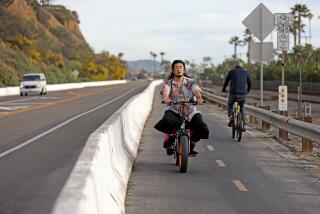Let the Games Begin
- Share via
The long-awaited California lottery begins today when 400 million scratch-off instant game tickets go on sale offering prizes from $2 to $1,000 with an ultimate chance of winning $2 million. There have been some glitches, such as the vendors who sold tickets before the official start-up and last-minute problems of distribution of tickets and promotional materials. But give credit to Gov. George Deukmejian, the state Lottery Commission and the first lottery director, Mark Michalko of Ohio, for taking their time in trying to get this massive new enterprise off to a professional start.
Michalko did not seem perturbed that the governor, who opposed the lottery initiative last November, declined to participate in opening-day ceremonies. “We want to keep it separate from politics,” he said. Michalko also is confident that California’s lottery will be secure from any attempt to fix winners. But cheaters can be creative. We urge Michalko to keep his guard up. Lottery enforcers must also be diligent to prevent the sale of tickets to the under-18 set that so often frequents the convenience stores and other likely lottery outlets.
We’ll forgive for now the mental lapse that caused Charles L. Rubner, the lottery’s advertising agency executive, to declare that the lottery is not gambling. Rubner prefers to call it “fun for a buck.” Even Michalko had to grin at that. As for the fun, there will be 45.1 million winners (40 million of them getting $2) and 354.9 million losers out of the first batch of tickets. Clearly, some will think it’s more fun than others.
The television ads produced by Rubner’s firm, as promised, are low-key and homey, seeking to make Californians feel “comfortable” with the lottery. They are so down-home, and almost Down East, the same ads would work for Pepperidge Farms, L. L. Bean or True Value Hardware.
Of course, the ads emphasize that 34% of the lottery proceeds will go to benefit California schools. It will be a constant struggle to make sure that the money truly supplements current state aid to education and is not allowed to take the place of it.
The dispute goes on as to who will play and what social good or ill might be created by the lottery. If nothing else, the new California Lottery may provide fodder for some doctoral theses and sociological studies.
The Times opposed the lottery initiative last fall and still believes that gambling is not a proper source of government revenue. But the voters seemed to want the lottery and it’s here. We wish Michalko et al a scandal-free operation in which the truly deserving always win.


